“Citizens’ assemblies” are a reformist pacifier
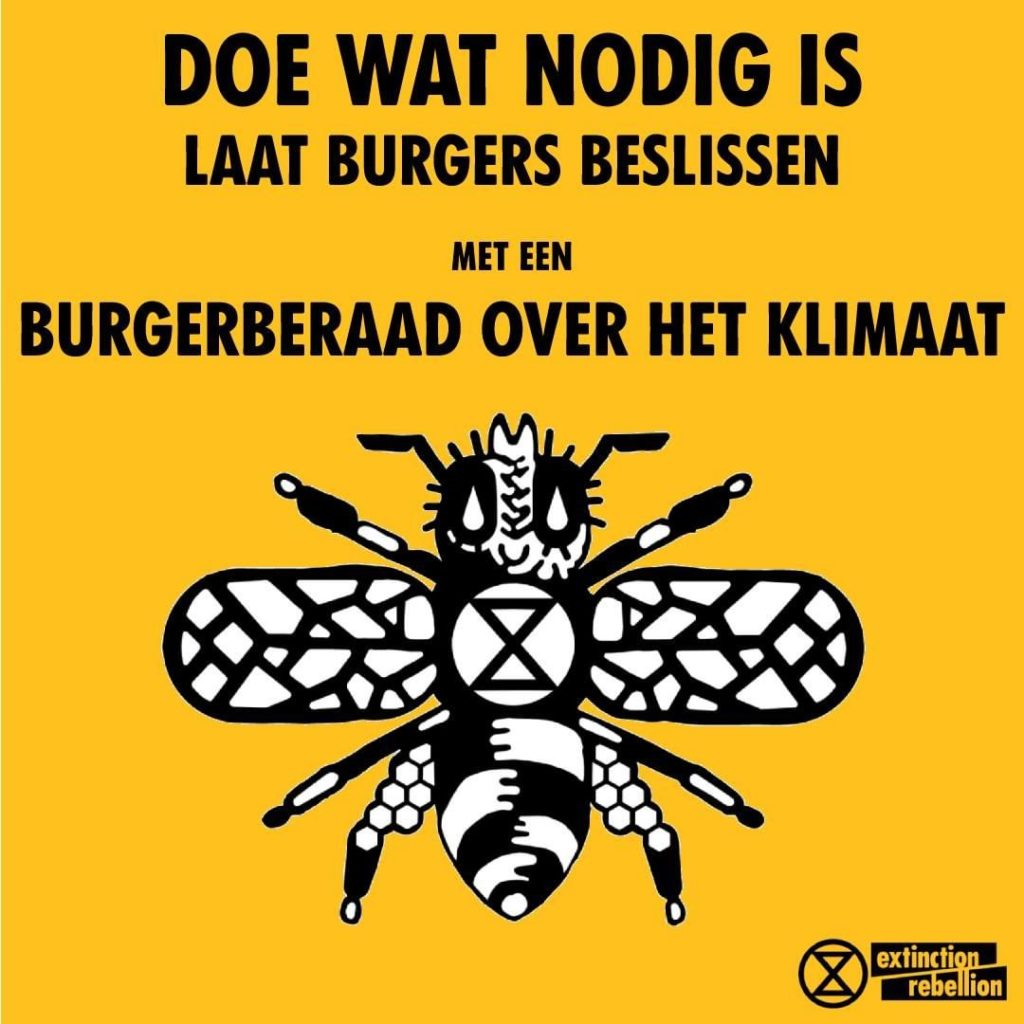
Many left-wing activists have looked in amazement and admiration at the rapid rise of the international climate movement Extinction Rebellion (XR) in recent years. It organises itself in a basic democratic manner, occasionally blocks the centres of large cities and still gets a lot of people on board. Not all movements succeed in doing this! But is XR really as radical as its blockades suggest? The movement has three demands on the state: be honest, do what is necessary and there must be a “citizens’ assembly”. The latter is a remarkably reformist demand for such a radical movement. XR seems to have changed quite a bit in response to the justified criticisms of ignoring racism, and we can hope that the bureaucratic demand for a citizens’ assembly will also be reconsidered.
I took part in a big XR action in London two years ago. In Leiden I know a number of XR activists, all great comrades who propagate a radical-left and intersectional thought. I went to meetings with them, and together we campaigned against Shell and for a higher minimum wage through the #Leidenvoor14 campaign. It was also the Leiden XR activists who took the initiative for the local manifestation for refugees in June last year in which Doorbraak also participated.
The original article in Dutch. Het originele artikel in het Nederlands.
Because of its basic democratic organisational structure, however, XR members can express very different ideas locally, nationally and internationally. Internationally, there has been much criticism in recent years of the movement’s insensitivity to racism, and Doorbraak has shared a series of pieces from that discussion on our website. In particular, the strategy of peacefully allowing oneself to be arrested at street and bridge blockades is something which shows the movement does not sufficiently take into account the unpleasant experiences of many non-white people with the police. Because of the friendly relations with the police during these actions, XR sometimes came across as a white middle-class movement that mainly acted its radicality.
Together with facsists?
At XR’s first presentation in Rotterdam a few years ago, the British speaker who had flown in claimed that her movement was “above politics” and that members of, for example, the extreme-right Forum for Democracy (FvD) could also join as long as they shared the same ideas about the climate crisis. This idea was repeated in October last year by XR Amsterdam in a tweet that included the statement: “We want a popular uprising, so even for FvD members our doors are theoretically open as long as they subscribe to the P&V’s.” * Doorbraak responded with: “Whoever opens the door for fascists, throws it in the lock for everyone who is not white. For everyone who is left-wing. For anyone who suffers from patriarchal domination. Yes, to anyone who is against the capitalist destruction of the ecosystem.”
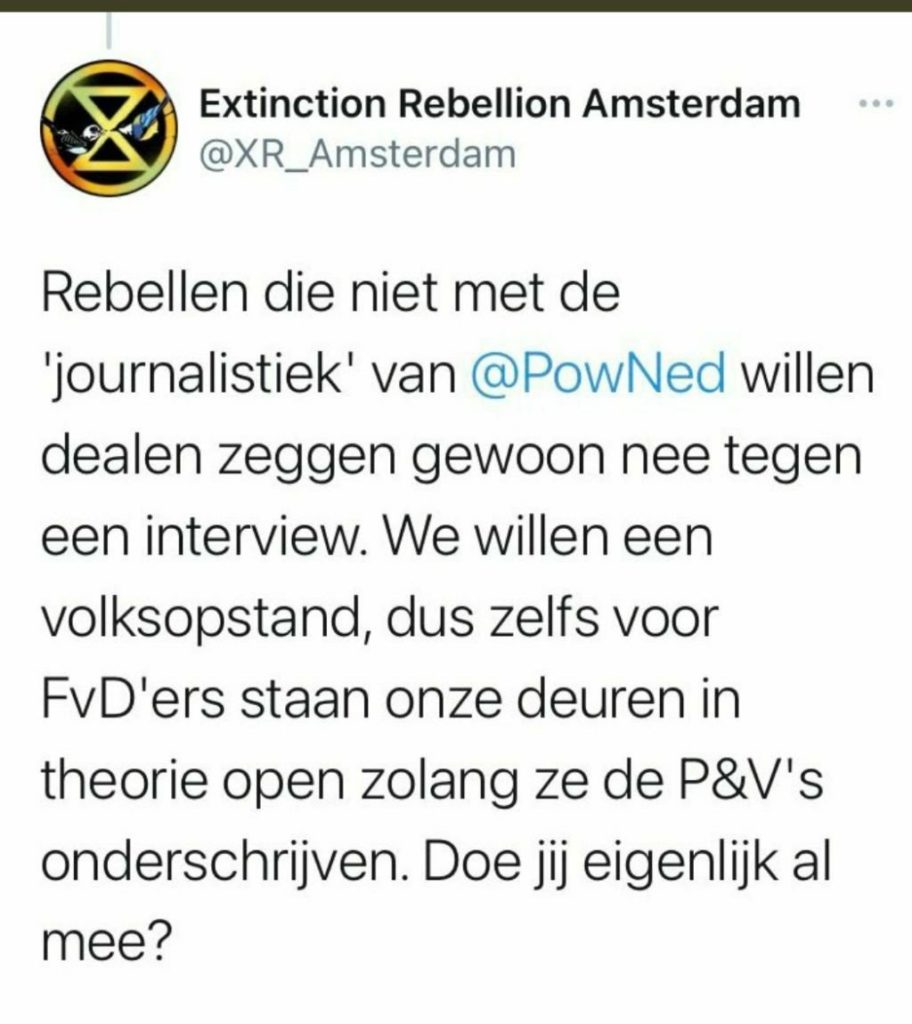
Many others also reacted critically and XR quickly removed the tweet and posted a fine new message: “Earlier today, we posted a thoughtless tweet. In doing so, we did not do justice to the inclusive movement that we want to be. We have heard you and will learn from you. #reflection”. It seemed that the administrator of the account had not yet sufficiently understood that the Amsterdam branch did not (any longer) share the ideas of the British founders.
“I have a muslim background, and after reading this tweet, I really don’t feel like sitting down at the table with XR, because there might indeed be a fascist sitting next to me who would rather deport me, but also because I definitely don’t feel the need to have to explain to a lot of white XR people what’s so wrong with this tweet”, someone understandably reacted. Still, some white XR activists insisted that talking to FvD members was a good idea, also within the climate movement. Because otherwise XR would be exclusionary, and they wanted to be an inclusive organisation. We reacted like this: “The problem is that you would talk to FvD members. Fascists would want to talk to you (I assume you’re white), but not to non-white people (who have to leave or die, in the eyes of fascists). So by starting that conversation (and thus making use of your white privilege) you and this FvD member are excluding non-white people and you are being racist. You may think you are ‘neutral’, but in fact you have taken sides. And you have made fascism socially acceptable.
Another XR activist said that we should not “see politics in everything”. Doorbraak replied that it was not about that: “Everything ís political. You can think you are politically neutral, but that means siding with the oppressors and the exploiters. When it comes to racism, for example, only white people have the chance to pretend they are ‘neutral’. Non-white people suffer from racism all their lives, and cannot pretend it is irrelevant.”
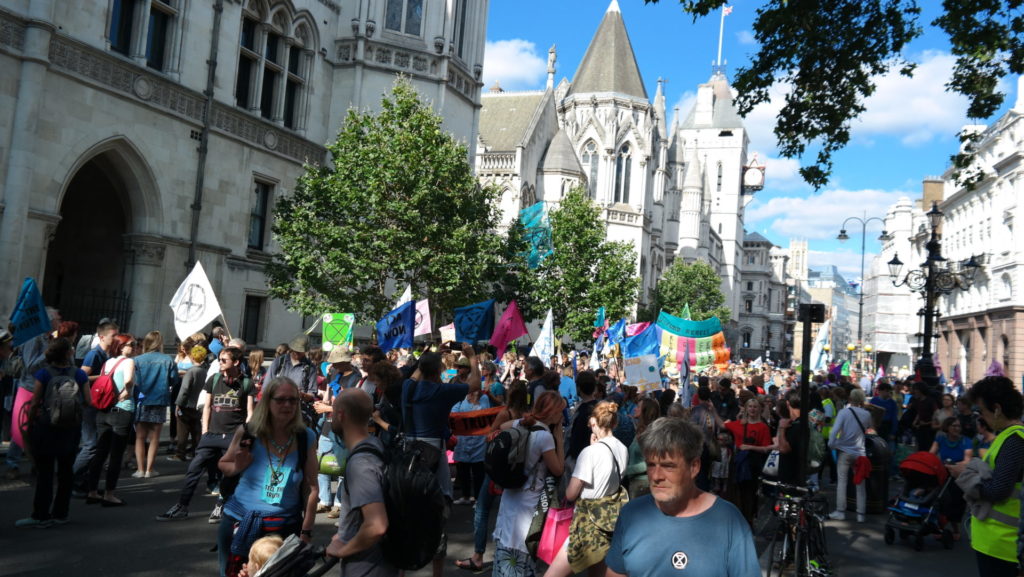
Eva Rovers, editor of the XR book “Nu het nog kan” (“While there is still time”), who in her texts almost compulsively pleads for peaceful protest and once claimed that the movement against the Dutch blackface tradition Zwarte Piet was not friendly enough, had little trouble with the deleted tweet and the openness towards FvD members that it expressed. She reacted via a tweet with a meme containing the text: “I do not agree with what you have to say, but I’ll defend to the death your right to say it.” The activist apparently believes that fascism is just an opinion, and is even prepared to die for the freedom of FvD leader Baudet and his followers to spread hate. Rovers plays a major role in XR and on Wednesday 27 January pleaded for a “citizens’ assembly” in the Lower House Committee on Economic Affairs & Climate.
Set-up by Rovers and Nijpels
It is remarkable how relatively easily XR has found a listening ear in politics for the proposal for such a “citizens’ assembly”. The prominent VVD member and chairman of the goverment Climate Change Consultation Ed Nijpels even wrote a laudatory article about it in the NRC last September, in which he also quoted Rovers. XR reacted enthusiastically to the piece. This is surprising, because Nijpels sees “citizens’ panels”, as he calls them, mainly as a way to “increase involvement in decision-making, understanding and thus support”. According to him, the lack of a strong climate policy is due to resistance from the population. In the eyes of the acclaimed VVD member, we are the problem, not the companies and the economic system. “Distrust of governments and politicians stands in the way of climate measures”, he wrote, and “with citizens’ panels with a clear mandate, you can overcome that”. The “citizens’ assembly” is therefore a method of influencing the population, rather than with those with power, as you would expect from a movement from below. According to Nijpels, “citizens and policymakers must look for solutions together”, “work on a collective interest” and “get away from the polarising debate”. In other words, we should not attack mega-polluters like Shell, but enter into a proper dialogue with them and seek solutions together.
In an opinion piece in De Volkskrant, Rovers and journalist Jelmer Mommers in turn referred to the former VVD leader. In their view, too, the population is the main problem and “there is often a lack of support, especially where measures directly affect people in their streets and homes. Many people do not feel heard.” The two are passionate about parliamentary democracy and never cease to assure politicians that their “national citizens’ assembly does not replace parliamentary democracy, but enriches it”. They are so eager to join the The Hague circus that it is almost embarrassing. “It is not a referendum, nor is it a glorified public participation evening. It does not replace local citizen participation, but complements it. It does not make the ‘Hague drawing boards’ superfluous, but complements them and increases the chances of a successful transition.” And what do the two activists require from the government on behalf of XR? No more than that it “promises to take citizens’ recommendations seriously”!

Just like XR itself, Nijpels presents all kinds of success stories of “citizen panels”. But whether you can call the result of any “citizens’ panel” a success depends, of course, on the objectives you had in mind. And the more in line your objectives are with the needs of those in power, the greater your chances of success. Who knows, perhaps in the cases of success mentioned, the same or even greater results could have been achieved by other means. Of course, this depends on political atmosphere in a country, on demographic developments and all kinds of other factors. A fixation purely on the form of a citizens’ assembly takes our eyes away from that context, and makes one forget that there are many other possible (actual!) solutions to the climate crisis.
A well-known and recent example of a citizens’ assembly, when it comes to the climate crisis, is that of French President Macron. He called a “convention citoyenne” in 2019 with 150 enrolled people who were allowed to come up with climate proposals. The assembly was a response to the Yellow Vests movement. Or rather, an attempt to channel the anger of that movement in a way that was safe for those in power. The Yellow Vests had rebelled after an announced tax increase on petrol. The area over which the assembly could speak and make recommendations had been severely restricted beforehand, so that vested interests would not be compromised, and Macron also granted himself a number of vetoes. In the meantime, it seems that almost nothing will come of the implementation of the proposals formulated by the assembly.
Nijpels will consider a possible Dutch “citizens’ panel” on climate to be successful if we all support government policy after it finishes. However, if our aim is to use it to push through fundamental economic changes, which are indispensable if we are to actually tackle the climate crisis, we will undoubtedly come up against a brick wall.
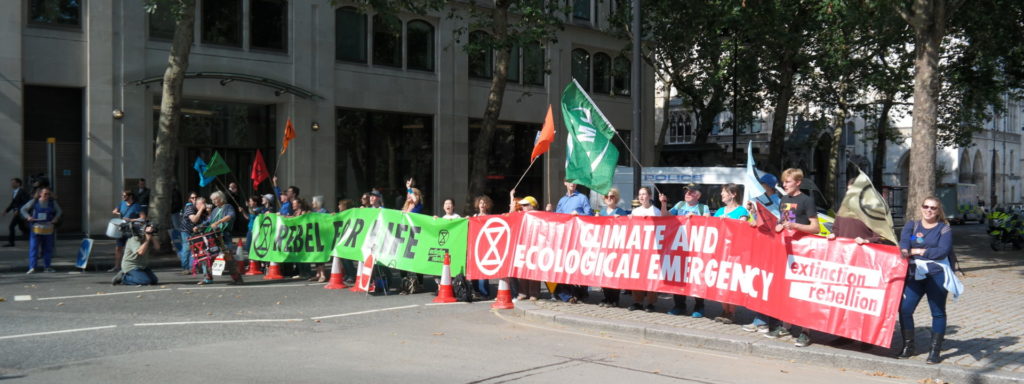
Legal boundaries
But what is a “citizens’ assembly” anyway? This question was answered by XR Nederland in an article last August, and the proposal was further developed in a brochure the following month. XR’s idea is that an independent group of “citizens” are drawn together by lot to discuss climate measures, and they can be informed as they see fit by experts, NGOs, experience experts and other stakeholders. The draw should be “stratified” so that the group forms a good cross-section of the population. And because the participants are not politicians, they could formulate opinions without electoral considerations, taking into account all interests and not only those of companies or other special stakeholders.
The question that is put forward for deliberation must be formulated by the government, according to XR. The group should be allowed to think freely, but XR requires that the proposals they come up with are “feasible”, “within the legal limits”, “based on expertise” and first assessed by lawyers for “legal feasibility”. Oh yes, and the proposals must lead to “the best possible justice for the present and future population”. As well as possible within the current destructive “legal” order, that is. And finally, the government should give the assembly “a mandate”, according to XR. For example: “if sixty per cent of the citizens’ assembly agrees, we will adopt the proposals immediately”. But those who want so emphatically to colour within the lines will never be able to get substantial changes on the agenda, let alone push them through.
“A citizens’ assembly uses the knowledge, sense of justice and intelligence of the people it concerns”, writes XR. “The climate crisis requires everyone to look beyond ideological differences and put the common good first.” Because, Rovers states in an interview at the bottom of the article, “decision-making about ’the climate’ has become politicised”. According to her, we have to get rid of that. “Citizens’ assemblies are not a replacement for parliamentary democracy, but its necessary update: they strengthen our current democracy so that it is ready for the 21st century.”
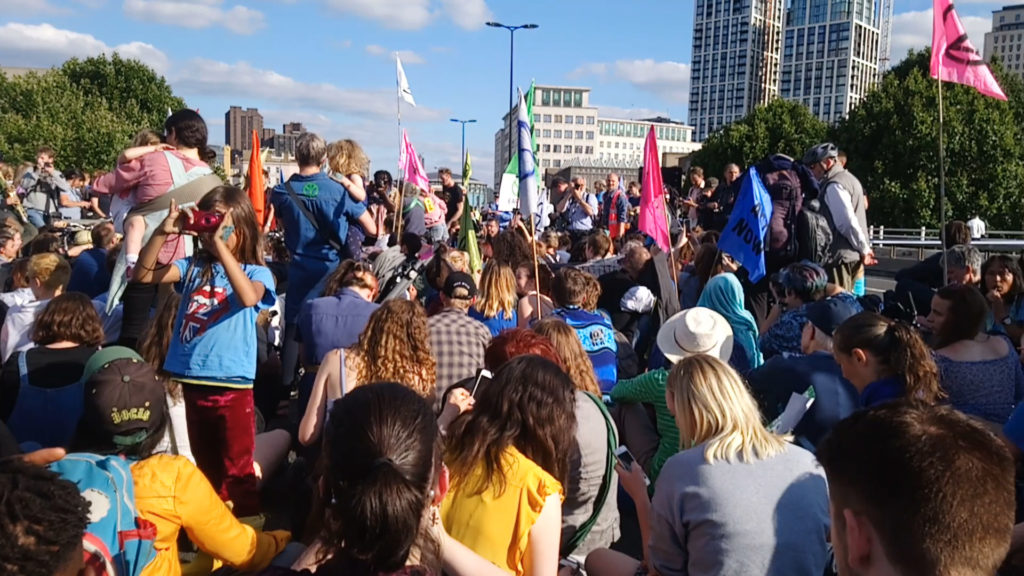
Middle class
The people who once formulated the idea of XR have thus arrived at a thoroughly middle-class concept, “citizens’ assemblies”. Perhaps with the idea of keeping a distance from left-wing movements in the hope of gaining easier access to circles of power. In order to finally be able to join the ranks of those in power, to have a say and really change things. But they have thrown the baby out with the bathwater.
The middle class doesn’t really want to do politics, doesn’t need to do politics. It is fine as it is. Concerned about the climate crisis, the founders undoubtedly wanted to help bring about real change, but they did so while preserving the current political order, the capitalism that gives them such a privileged position. Their attempts at solutions will therefore always be technological. Politics, with all its contradictions and electoral considerations, is what they want to keep out, they say. But in fact, there are hardly any real political opposites in parliament: all parties are in favour of maintaining capitalist relations. In practice, “not doing politics” means excluding revolutionary anti-capitalist views from the debate and the struggle.
It is, of course, a good thing that in XR’s assemblies citizens can learn in detail about the latest insights of scientists about what is going wrong. After all, today’s political leaders do too little of this. But when it comes to where we want to go with society, what measures should be taken, the debate – whether XR wants it or not – shifts from the domain of science to that of politics. And scientists and their science are not politically neutral, simply cannot be. Every technological measure that such a citizens’ assembly will come up with is politically charged, that is simply unavoidable.
What XR, and the politicians espousing their plans for a citizens’ assembly, claim is that we are all in the same boat, but we are not. Society is structured along capitalist, patriarchal and racist lines. What XR seems to be arguing for is a technical solution that preserves oppression and exploitation. But the ecological crisis is precisely caused by the global system of oppression and exploitation: capitalism with its compulsion for growth. Advocating against the “politicisation” of the climate crisis therefore means ruling out a real solution from the outset.
Individualisation
The individualising effect of the drawing of lots that would start a citizens’ assembly ensures that the only forces that can bring about real change, the radical environmental movement and combative endangered communities, are sidelined in the debate. After all, the only strength the climate movement has lies in collective struggle, in collective resistance. And it is precisely in that collective resistance to the eco-destructive system that the best ideas for a different society, a more just society and an ecologically responsible economy are born. Through the liberal concept of “citizen”, on the other hand, XR refers to individuals who are basically on their own and therefore powerless against the state and the ruling order.
As far as its image is concerned, XR is partly riding the wave of the global trend in action circles towards broad, bottom-up democratisation, as was very clearly illustrated by the occupation of Tahrir Square ten years ago in Cairo, and subsequently by the square occupations in Greece, Spain and Turkey, and of course also by Occupy. But the citizens’ assemblies are a completely stripped-down and depoliticised version of that. In service of the government, instead of taking a stand against it. With an enormously limited discussion beforehand, compared to the freedom of thinking and organising at the time in Cairo. With a dull and extremely well-behaved official appearance instead of the pure joie de vivre that the Egyptian occupiers regularly displayed. And not to forget: with only “citizens” of the state in question. Of course, real democracy would never so emphatically exclude the “citizens” of other states who live in the country ‘legally’ or ‘illegally’! The choice of only “citizens” is unfortunately not a coincidence: the initiators of XR expressly also wanted to be in line with right-wing ideas that exclude people. According to founder Gail Bradbrook, “the campaign would aim not only to tap into progressive concerns about social justice and equality, but also traditionally conservative themes such as national security and protecting family.”
Pulling in the direction of reformism
From their privileged position, the founders of XR cannot and will not perceive the fundamental causes of the climate and wider ecological crisis: global capitalism based on colonialism, racism and patriarchy. For them, without saying it out loud, this is precisely the starting point of the present and any future society they would like to fight for. Hence also that their “citizens’ assemblies” may only come up with plans that remain within the limits of the system, limits that are protected by law. And hence also that XR activists are not seen as a real danger by the state and its strong arm, the police, and at first they were allowed to play out their radical actions without much repression, in good consultation with officers.
But as the movement grew and also became international, more and more activists with leftist and more radical ideas entered. This led to a lot of criticism on XR, especially from within, to separation of sections and even whole countries, and as expected to more repression from the state. Because, of course, really radical resistance is not appreciated. The disappointing thing is that quite a few climate activists have now criticised XR’s inability to formulate a response to racism, but much less have they rejected the problem of the assemblies, which largely stems from the same white middle-class thinking.
It is amazing that all kinds of radical-left activists inside and outside XR just keep calling for these citizens’ assemblies. While on all other occasions they emphasise that fundamental political changes, indeed revolutionary changes, are the only way in which human society as we know it can still be saved. XR cultivates a radical image with the blockades, but via the idea of citizens’ assemblies it draws a whole generation towards a completely fruitless reformism, towards a ‘strengthening’ and legitimisation of the parliamentary system. If XR really succeeds in getting the state to set up a citizens’ assembly, the supporters will from then on be allowed to look on passively and powerless. And they will most likely also be expected to submit to the measures that are subsequently ‘democratically’ adopted. Which, as I said, may not amount to much.
I once heard an XR activist say that a citizens’ assembly would indeed not achieve much. But that ’the people’ who cannot be motivated now for fundamental changes, might become so angry after the failure of a possible citizens’ assembly that they will then take to the streets. And that only then will they politicise further. But that is of course a very dishonest, paternalistic and opportunistic attitude: first delude the people with whom you ultimately want to move forward into believing something that you yourself do not believe in. And then hoping that they will join your movement. Let’s be honest and start making radical and even utopian demands here and now, which might scare the middle class, but at least keep us moving towards the real solutions.
The rapid rise of XR gives me hope. It shows that many people are fed up with the procrastination of state and capital when it comes to real measures to save the ecological system and humanity. And that it is precisely a seemingly (!) more radical approach that motivates these people to take to the streets. What also makes me hopeful is that more and more activists in XR and the rest of the climate movement seem to take the anti-racist and decolonial criticism seriously. We still have a long way to go, but more and more positive examples are starting to emerge. To give a recent, international example: in early February, there was a strong joint action by Palestine Action and Extinction Rebellion North against an Israeli arms company. This was an important message to those who refuse to see the connection between the struggle against colonialism, structural oppression and for climate justice. “We recognise the overlapping injustice and exploitation that reinforce the struggles so many of us face. Whether it’s poverty wages, obscene inequality, the destruction of our living world, or racist oppression”, said the XR spokesperson at the action.
The hope now is that, like racism, the climate activists will also reject the citizens’ assemblies. Like racism, they too stand in the way of real change. When we chant “change the system” at demonstrations and blockades, we do not mean “add a glorified advisory committee to the parliamentary system”. We are not calling for yet another bureaucratic layer, a cushion, between the movement and those in power. There are already to many environmental NGOs and ‘green’ and ‘left’ parties that fulfil that function. The hope is that the activists will come to realise that we are not getting anywhere with such a Greens-like proposal, and that we are even taking a step in the wrong direction. The hope is that the activists will realise that our radical methods deserve truly radical demands!
Eric Krebbers
* P&V’s are Principles and Values.
